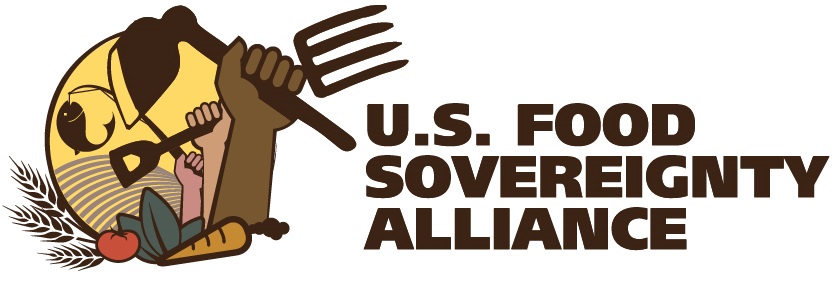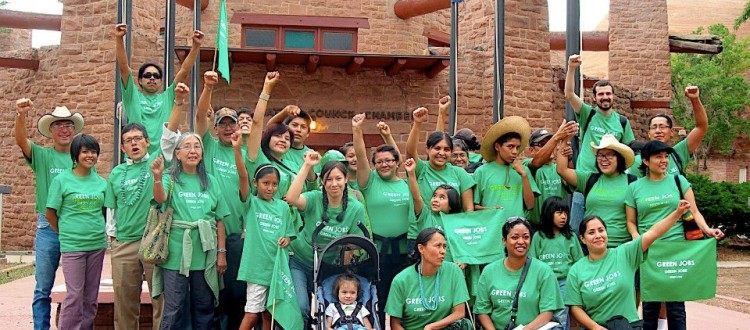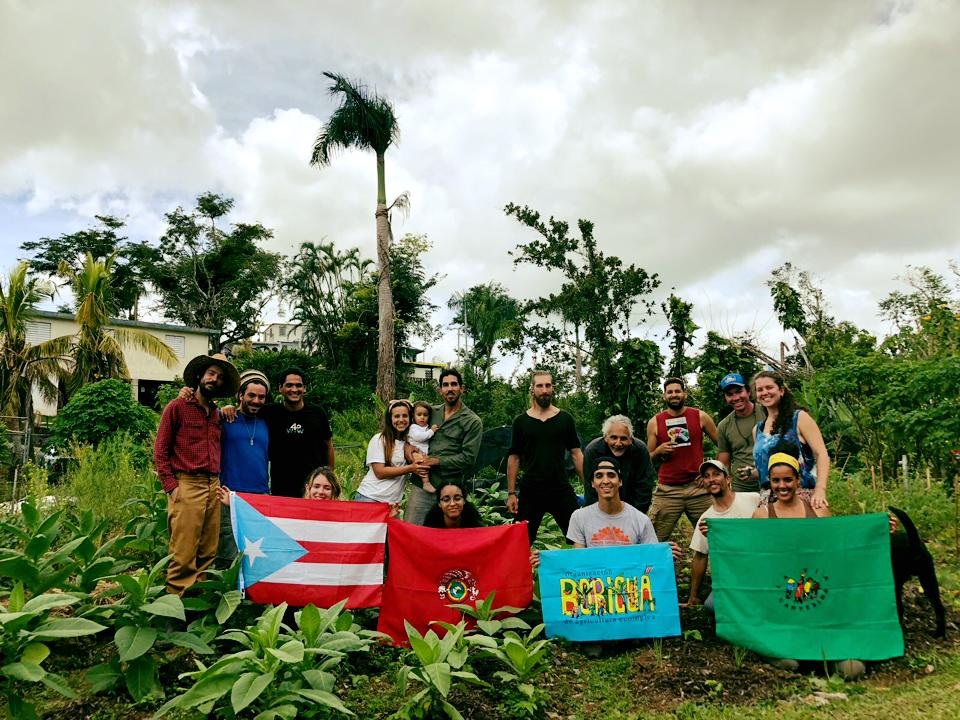The U.S. Food Sovereignty Alliance (USFSA) is delighted to announce the recipients of the 2018 Food Sovereignty Prize. In the domestic category, Black Mesa Water Coalition will be honored for their commitment to restoring indigenous food sovereignty and uplifting youth leaders among Navajo and Hopi communities. Organización Boricuá de Agricultura Ecológica de Puerto Rico, the international honoree, will be recognized particularly for their mobilization of Food Sovereignty Brigades to assist farmers with recovery efforts in the aftermath of Hurricane Maria.
The tenth annual Food Sovereignty Prize Ceremony will take place in the evening of Sunday, October 14, as part of the USFSA’s IV National Membership Assembly in Bellingham, WA (October 12–15). The Assembly, anchored by Community to Community Development (C2C), will be the first national convergence since the Alliance transitioned to a regional structure following the III Assembly in 2015. Coordinators from each geographic area have organized regional assemblies this year – Southeast (April); Northeast (August); Midwest (August); and Northwest (September) – to mobilize members and allies toward the meeting in October. Please register for the IV Assembly, and follow the USFSA’s website and social media for regular updates.
About the 2018 Honorees
Black Mesa Water Coalition
Black Mesa Water Coalition (BMWC) formed as a student-led group in 2001 and has since evolved into an intergenerational, inter-ethnic organization based in Flagstaff, Arizona. BMWC utilizes green economic development and other proactive strategies to address the immediate and long-term needs of Navajo and Hopi communities. The Coalition promotes indigenous food sovereignty as a paradigm rooted in tribal elders’ accumulated knowledge and ways of knowing. They emphasize the importance of songs and ceremonies for remembering ancestral traditions and reversing cultural erosion. As part of its Navajo Restorative Economy Program and Food Sovereignty Project, BMWC directs food production and educational programs on a thirteen-acre community farm. Their dry-land farming strategy avoids the use of groundwater irrigation. Their aim is to adapt to natural landscapes by selectively choosing the production sites and constructing water catchment systems where needed, e.g. berms, canals, and spillways. BMWC has organized communities to declare Black Mesa a GMO-free zone, and the organization has been advocating for Navajo Nation-wide policy change that, according to Just Transition principles, promotes land and watershed restoration. The Coalition participates in the Indigenous Environmental Network as well as Grassroots Global Justice Alliance and Climate Justice Alliance.
Organización Boricuá
Organización Boricuá promotes food sovereignty and climate justice under extremely difficult neocolonial conditions in Puerto Rico, particularly the intensification of disaster capitalism following Hurricane Maria last year. Organización Boricuá has worked for almost three decades to support family farmers and expanding the agroecology movement on the island and abroad. In addition to resisting Monsanto’s presence on the island, Organización Boricuá has mobilized campaigns against the spraying of the Naled insecticide in response to the Zika virus, and through networking with farmers and other advocates of agroecology, they organize monthly work parties in solidarity with peasant communities. Their Food Sovereignty Brigades deserve specific recognition in the context of ongoing recovery efforts. Several USFSA members and partners have supported them following Hurricane Maria, mainly in terms of fundraising, gifting seeds, and sending delegates to engage in solidarity actions. Organización Boricuá is a member of Climate Justice Alliance, MAELA (Movimiento Agroecológico de América Latina y El Caribe), and La Via Campesina.
About the Food Sovereignty Prize
By awarding the Food Sovereignty Prize annually since 2013, the USFSA extends its network and continues to build solidarity with frontline organizations struggling to democratize food systems in the U.S. and abroad. Recipients of the Prize (first awarded in 2009 through the Community Food Security Coalition) demonstrate how another world is possible and that real solutions to social and ecological crises derive from popular power at the grassroots level, from those most impacted by the social costs and environmental impacts of industrial agribusiness. In addition to establishing global linkages, Prize honorees prioritize the leadership of marginalized food providers, including women, indigenous peoples, people of color, migrants, and youth.
The Food Sovereignty Prize presents a counter-narrative to the World Food Prize, an award founded by Norman Borlaug and annually given, since the 1980s, to individuals credited with achievements in improving the availability or quality of food in global market systems. The USFSA opposes the corporate-driven neoliberal ideology that underpins the World Food Prize’s glorification of the Green Revolution, which intensified dependence on genetically-modified seeds, synthetic fertilizers, and other chemical inputs and prompted a global shift to an oil-based economy, caused the loss of ninety percent of the Global South’s biodiversity, and forced the displacement of millions of peasants to urban slums, where they became a reserve army of labor.
While agribusinesses and philanthrocapitalists praise the 2018 World Food Prize winners – Dr. Lawrence Haddad and Dr. David Nabarro – for their efforts to increase national and global dialogue on the topics of maternal and child malnutrition, the USFSA awards this year’s Food Sovereignty Prize in honor of how BMWC and Organización Boricuá defend and scale-up people’s agroecology under the banner of food sovereignty. Utilizing a Just Transition framework, the domestic and international honorees offer viable pathways for ending poverty, hunger, and malnutrition following centuries of imperialism in the Southwest and Caribbean. The USFSA recognizes their work as grounded in ancestral wisdom and a spirit of resistance to domination and oppression. During the Food Sovereignty Prize Ceremony, the Alliance will amplify their struggles toward achieving truly sustainable agricultural and energy systems based on principles of ecological harmony, political-economic autonomy, and social justice.
Announcement written by Tyler Short, Sustainable Agriculture of Louisville







One thought on “Announcing the 2018 Food Sovereignty Prize Honorees”
Comments are closed.